Saturday, August 20, 2005
Title: Worldcon - Interaction 2005
Detail: 4th-8th August 2005, SECC/Moat House, Glasgow
Part:7. Sunday.
Sunday 7th August 2005.
Sunday 10:00 AI: The Aliens We Make?
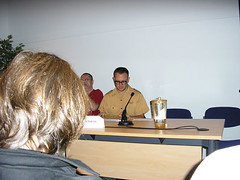
Cory Doctorow chaired this panel first thing on the Sunday morning. A panel that was supposed to feature David Gerrold, who didn’t make an appearance. Along with Tricia Sullivan, who we had already established hadn’t made the Con at all. This left Cory with Ian McDonald and Charlie Stross. Cory started the discussion by prompting Charlie to pass comment on his believe that corporations exhibit strange emergent behaviours, which could be described to be a form of artificial intelligence – an idea that is quite prominent in his novel Accelerando. From Stross to McDonald, and some commentary on his novel River Of Gods, which features aeias, and the Indian soap opera that they generate.
To add some perspective to the discussion about the requirements of intelligence Stross provided some statistics, including that the brain uses 20% of a person’s metabolic budget. So that “fuel” is always going to be an issue when dealing with the evolution of intelligence. From there the panel discussed whether humans really are particularly intelligent – with the suggestion that the entire race could really be coasting along on the coat tails of the 1 genius in a billion, the one who really pushes the boundaries back that next degree for us all to exploit.
Doctorow compared Asimov’s 3 law’s or robotics to an “autistic yearning for human emotion”, a yearning for a firm existence where people actually obeyed the rules. Though this was expanded to talk about how it represented Asimov’s fear of chaos, which stemmed from moving from Russia to America. From Asimov, the conversation moved on to Ray Kurzweil, who has been involved in the development of voice and image recognition. More recently becoming “evangelical”, as Stross put it, about emotional machines.
Ian McDonald made an observation about planes that can now take off and land by themselves, and how that might only be as intelligent as an insect, but it was still artificial intelligence. Stross talked about Ford paying MIT to develop cars with emotional sensors, that could react to the driver’s emotional state. While Doctorow mentioned call centre software that has been developed to recognise anger, and chances are that if you just shout “no” at the start of the process you will be put through to a human quicker.
Discussion covered ideas like the fact that there is no scientific evidence of a soul, and how often people working in that area have a goal in mind and set out about trying to support it. About how the mind works on the neurological level, or how if we can create split occurrences of an intelligence, how would we reconverge them?
Doctorow brought up the idea of aggregated I instead of AI, using online gaming as an example. How previous attempts at online AI had failed, with the solution that was found being to throw people with spare time at the problem. So that people play the parts of non-gaming roles, and they do so by entering a competition. Whereas, of course, if you tried to force people to take these roles, as part of their subscription, they would be appalled.
Then Stross started to talk about “spam blogs”, fake blogs created to get hits on engineers like Google, and generate traffic towards false sites. Examples of this can often be found on blogger’s recently updated site list daily posts containing nothing but a selection of key words designed to generate traffic. Doctorow talking about spam as being a generating cycle of an AI, and how it would not be surprising if the first AI to pass the Turing test were a spam bot.
Sunday 12:00 Genre Killing Ideas
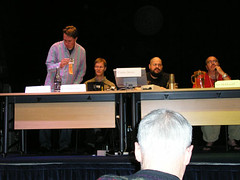
“The Singularity is this enormous turd that Vernor Vinge crapped into the punchbowl of SF writing, and now nobody wanting to take a drink can ignore it.”
So said Charlie Stross, which is why he became the moderator for a panel about genre killing ideas. A panel that included Alistair Reynolds, Ian McDonald and Karl Schroeder. One of the first definitions that was given of a genre killer was “something that makes your characters safer.”
The McDonald started talking about how constant sentience is quite a recent development in terms of humanity. How in the dark ages peasants sat in front of the fire and thought about nothing, as long as their “balls felt warm” they were happy. Which on reflection I’m not sure what that had to do with anything. Though I guess it was to demonstrate the idea that things like genre and the amount of books we have open to us are recent developments, and things are always changing.
Schroeder then talked about how he had been hired by the Canadian army the previous year to write a novella for them. The topic being about military and war in say twenty years time, but how everything he could think of could be solved with a mobile phone. Which the panel agreed was a good example of a plot killer – how many crime or horror novels could be scuppered with by a mobile? Stross observed how mobile phones could actually render stealth technology redundant with the use of celldar. Stealth technology involves redirecting waves that hit it, so that they don’t go back to the radar and pinpoint them, but at the same time mobile phone companies are looking to prevent outages in their coverage.
From celldar to camera phones, and how this almost creates a 24 hour recording culture; Bob Shaw’s Slow Glass was referenced as being something which had gone in this direction. With a webcam and broadband you can have planetary neighbourhood watch, apparently people create rotas of people who will watch their house of them while they are out. While it seems that a French cable channel transmits footage from CCTV cameras 23-hours a day so that unemployed people can sit at home and watch, and if they see a crime happen they can report it. From the abuses of things like webcameras and phone cameras, comes the idea of how porn drives technology, with Stross quoting a comment by Cory Doctorow about a million porn monkeys. Stross’s addition to that being “tits and ass all the way to the singularity”
The panel observed that science fiction writers could be slow to pick up on ideas, especially where the idea could undermine their work – the given example being how long before they acknowledged relativity. With this there were some stray thoughts. A conversation about Peter Watt’s and his novel Blindsight. Schroeder’s concerns that Bob The Builder includes neurotic AI, and who would actually programme a machine to think like that? To an autistic woman who works with animals in a slaughter house to reduce their anxiety, with the concern of how long would it be before this kind of theory was applied to humans.
Back on topic, the panel discussed the importance of limits in fiction - if there are no boundaries then it is hard to pin the story down. From there, do new ideas really kill ideas? Something like Time Travel can kill a genre, and to a degree Stross said he was exploring and making light of that idea in his novel Singularity Sky – where he did the equivalent of putting a Napoleonic fleet up against a nuclear submarine. This led to commentary on how corporate interest kills innovation, but without innovation the corporate is killed. Accompanied by the concept that new technology kills crime, while new technology finds ways round that. Which applied to fiction, suggests that there is a fine line between an idea that kills a genre and one that inspires it to new heights.
Sunday 13:00 The World We Are Making Now 2:Places
This was the second of 3 discussion about what we are doing the world today, and how that will effect the world of tomorrow, in particularly covering places – architecture, agriculture and infrastructure. The panel was chaired by Caroline Mullan, who managed to be quite abrupt and controlling, without actually explaining who she was and what her role in things was. She was joined by Joe Raftery, an architect/builder, who was involved in the millennium dome in London. Renee Sieber who had come from Canada, and was an urban planner and geographer. Yvonne Rowse an environmental officer, with a particular background in sewerage and water treatment works. Ian McDonald author of River Of Gods and Chaga, both of which have a kind of third world view of the planet. And Kim Stanley Robinson author of the Mars Trilogy, the Three Californias, and a contemporary series about environmental impact.
Raftery started the discussion, prompted by Mullan’s display of an architecture exhibit listed in her newspaper, talking about architects and how they like to talking about environmental design, but in the end are still interested in having lots of glass and steel. Then he talked about how hard it was to get the “clever” bits in a building to work. How so much is spent on design and build and then skimped on the actual commissioning of the finished product.
This was then passed on to Sieber, who developed the discussion, talking about the fragmentation of habitats. How these kind of building developments always want to be placed in isolation, with lots of green fields and extensive parking. McDonald talked about India, and how the software boom in Bangalore had transformed the city in to a series of gated communities, while he personally preferred the sprawl of Delhi. What he called the lattice versus the tree, Bangalore spreads out in branches like a tree, while Delhi interweaves communities, interlinking and nesting everything.
From India to England, and the proposals for the development of a Sprawl, the conversion of Barnsley into an Italian walled city. Which prompted McDonald’s suggestions that people come and see Barnsley’s “puke stained renaissance streets”. To a degree this highlights one of the big problems with building for tomorrow, in that we are building on yesterday.
The conversation was brought by to Rowse, and water. A lot of money is now being spent on using chemicals to clean water, while natural forms, like reservoirs are deemed too take up too much land, and presumably time. Though with this, we have the question of why are we using drinking water to water plants or to flush toilets? This evolved on to wind farms, inviting some debate from the audience as to the leakage involved in transporting electricity from remote locations versus the idea that these are the places with the most wind. This brought back discussion on the fragmentation of environments, and actions on a local level.
Kim Stanley Robinson was asked to talk about California, and his experience with how it had changed, compared to places like Shanghai (and Bangalore) that were undergoing that kind of change now. He talked about the greenery of Orange County, which were the focus of three of his novels, and how they quickly became suburbanised and industrialised. Pushing people like Robinson further out, ending up in an urban hippy community, the kind of place that never worked out. He talked about how much hippy writing had come from the period of about 1975-1980 that had dealt with environment and infrastructure, but had largely been ignored. Urban planners were more interested in Blade Runner, Neronmancer and Snow Crash.
Sieber recommended reading The Long Emergency, which talks about the future of post-oil infrastructure and urban planning. The conversation turned back to sewage once more, how places are using storm tanks to store sludge, and how when there is a storm the tanks overflow. London having experienced exactly that issue not that long ago, and lots of fish having died as a result. A member of the audience talked about new technology, and constant developments, how oil fields that were though to be dead could suddenly be reopened.
The panel headed for a break, discussing again money for construction but not for maintenance. How places like Shanghai are building towering blocks, without provision for sanitation. With the suggestion that as these places became business centres, and places for the rich to be for work, then these things would change – something evidenced 100s of years ago with the idea that “cholera doesn’t stay in the slums. With this, McDonald and Robinson had to leave after the hour for other panels and the like, though the other panellists remained on for those that wanted to take the discussion further.
Sunday 14:00 Cory Doctorow Reading
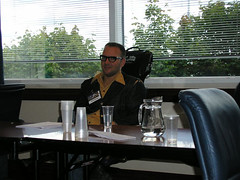
I took advantage of the break to head out, from the Armadillo back to the Moat House and the boardroom. Arriving, Doctorow was already there, sat back and relaxed behind the boardroom table – looking like he had fired the rest of the board and was preparing for world domination. When I arrived he was joking about pretending to read from Harry Potter and giving away spoilers if anyone arrived late. Then he explained how he wasn’t going to read from his new novel, Someone Comes To Town, Someone Leaves which is just out. Instead he was going to read from what he was working on now, since that was what interests him. This was from a novel with the working title “Theme Punk”, and you can hear his reading here.
Sunday 14:30 Signing
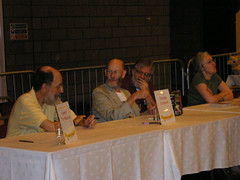
2.30pm I wandered into the dealer’s hall, where Susanna Clarke, Stanley Schmidt and Harry Tutrledove were signing.
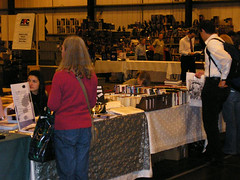
I had a wander about, buying some more books.
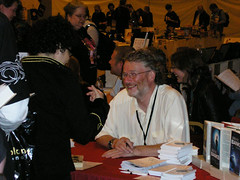
When arriving on Thursday night, there had been a sign saying that contrary to reports JK Rowling and Iain M. Banks would not be at Worldcon. A sign later went up from Banks’ publisher Orbit, saying that he would indeed be there and people could meet him at the Orbit table on Sunday at 2pm (he was still there the 40 minutes or so later when I went past)
Sunday 15:30 Signing
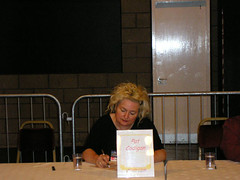
As Pat Cadigan had not been at pervious events when I had turned up, I didn’t expect to find her signing, so had left my books at home. But, she was there, signing. So I just got one of the little notepads Orbit were giving away signed as well.
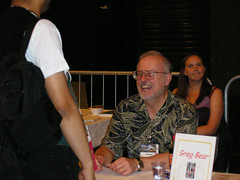
At the same time, Greg Bear was also signing.
Sunday 16:00 Karin Lowachee Reading
Between wandering about and the next event I grabbed my lunch, so I was sitting on one of the benches when I spotted Lowachee going towards the dealer’s hall on the run up to her reading. So I knew I had some time, and finished my lunch, watching for he heading back in the direction of her reading room. Lowachee’s books haven’t been published in the UK, which is likely one of he reasons why she had had a pretty quiet signing on the Saturday. I’d only heard her name recently from folk had read her stuff, and from her being on the panel about Race and Migration. She read a couple of selections from her new novel Cagebird, which follows space pirate and who he came to be who he was – first section was the character as a child, the second was from right at the start with the character in prison.
Sunday 17:00 Cyberpunks vs Humanists
This panel was supposed to feature Pat Cadigan, Paul McAuley and Justina Robson, all of whom I saw within hours of it’s starting time. However on arrival we were told it had been cancelled. Which scuppered my plans a little, given that the next event I was curious about was the Hugo awards 3 hours later. I bumped into the Norwegian girl from Thursday night, who was also at a loose end after the panels cancellation. We ended up meeting up with some other Norwegians, heading back into Glasgow for pizza and drinks. And that was us until about 11pm, and I had to head home for work the next morning.
Comments:
Post a Comment
 this is the voice of re:mote induction.
this is the voice of re:mote induction.